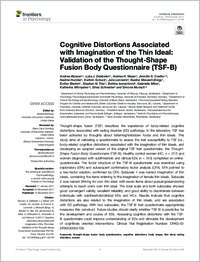Cognitive Distortions Associated with Imagination of the Thin Ideal: Validation of the Thought-Shape Fusion Body Questionnaire (TSF-B)
- Wyssen, Andrea Universität Fribourg, Schweiz
- Debbeler, Luka J. Universität Konstanz
- Meyer, Andrea H. Universität Basel
- Coelho, Jennifer S. Children's & Women's Health Centre of British Columbia
- Humbel, Nadine Universität Fribourg, Schweiz
- Schuck, Kathrin Ruhr-Universität Bochum
- Lennertz, Julia Ruhr-Universität Bochum
- Messerli-Bürgy, Nadine Universität Fribourg, Schweiz
- Biedert, Esther Universität Fribourg, Schweiz
- Trier, Stephan N. Privatklinik Aadorf, Aadorf
- Isenschmid, Bettina KEA Spital Zofingen
- Milos, Gabriella Universität Zürich
- Whinyates, Katherina Klinik Schützen Rheinfelden
- Schneider, Silvia Ruhr-Universität Bochum
- Munsch, Simone Universität Fribourg, Schweiz
- 19.12.2017
Published in:
- Frontiers in Psychology. - 2017, vol. 8, no. 2194, p. 1-10
Thought-shape fusion body questionnaire (TSF-B)
Cognitive distortions
Body image
Thin ideal
Eating disorders
Women
English
Thought-shape fusion (TSF) describes the experience of body-related cognitive distortions associated with eating disorder (ED) pathology. In the laboratory TSF has been activated by thoughts about fattening/forbidden foods and thin ideals. This study aims at validating a questionnaire to assess the trait susceptibility to TSF (i.e., body-related cognitive distortions) associated with the imagination of thin ideals, and developing an adapted version of the original TSF trait questionnaire, the Thought-Shape Fusion Body Questionnaire (TSF-B). Healthy control women (HC, n = 317) and women diagnosed with subthreshold and clinical EDs (n = 243) completed an online-questionnaire. The factor structure of the TSF-B questionnaire was examined using exploratory (EFA) and subsequent confirmatory factor analysis (CFA). EFA pointed to a two-factor solution, confirmed by CFA. Subscale 1 was named Imagination of thin ideals, containing five items referring to the imagination of female thin ideals. Subscale 2 was named Striving for own thin ideal, with seven items about pursuing/abandoning attempts to reach one’s own thin ideal. The total scale and both subscales showed good convergent validity, excellent reliability, and good ability to discriminate between individuals with subthreshold/clinical EDs and HCs. Results indicate that cognitive distortions are also related to the imagination of thin ideals, and are associated with ED pathology. With two subscales, the TSF-B trait questionnaire appropriately measures this construct. Future studies should clarify whether TSF-B is predictive for the development and course of EDs. Assessing cognitive distortions with the TSF-B questionnaire could improve understanding of EDs and stimulate the development of cognitively oriented interventions. Clinical Trial Registration Number: DRKS-ID: DRKS00005709.
- Faculty
- Faculté des lettres et des sciences humaines
- Department
- Département de Psychologie
- Language
-
- English
- Classification
- Psychology
- License
- License undefined
- Identifiers
-
- RERO DOC 323528
- DOI 10.3389/fpsyg.2017.02194
- Persistent URL
- https://folia.unifr.ch/unifr/documents/307524
Statistics
Document views: 143
File downloads:
- frontiers_cognitivedistortionsassociatedwithimaginationofthethinideal-validationofthethought-shapefusionbodyquestionnairetsf-b_1.pdf: 162
